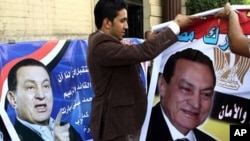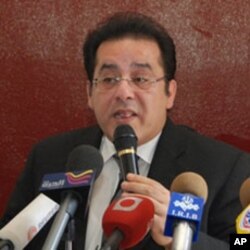Egyptians will vote for a new parliament next month, part of a cycle that culminates with a presidential election next year. Opposition forces are gearing up for what could be a momentous change after decades of President Hosni Mubarak's rule. But they are divided over how to approach this first hurdle.
Opponents of the ruling National Democratic Party are united in their assumption that next month's voting will be unfair. The question facing them now is what to do about it.
Ayman Nour, the Ghad party chief who challenged Mr. Mubarak for the presidency in 2005, advocates a boycott.
Nour says taking part in the elections gives them a legitimacy they don't deserve. He calls the voting illegal because the government has rejected opposition demands for international safeguards ensuring free and fair elections,.
He is joined in the boycott call by the former head of the U.N. nuclear agency, Mohamed ElBaradei, whose return to Egypt this year breathed new life into the flagging opposition. ElBaradei helped found the National Alliance for Change, a broad-based political movement aimed at uniting government critics.
|
Hosni Mubarak |
|
Current president
|
It is already struggling in its first test. Last weekend the Muslim Brotherhood, which supports ElBaradei, joined the left-leaning opposition parties Wafd and Tagammu to say its candidates would be taking part in the elections. They will run as independents as the party is officially banned.
Senior Brotherhood member Essam el-Eryan says he has no illusions that the voting will be free or fair or that the group will have any meaningful role in the next parliament.
"The participation is just to be not absent from the political scene or for some other causes, not for participation in the decisions, or in the government or in the rotation of power in as in any democracy," el-Eryan said.
Taking part in a campaign also gives political parties practice, showcases their ideas, and helps them build networks. It's a decision learned the hard way. Opposition forces boycotted elections in the 1990's and suffered a blow to organizational efforts that took years to overcome.
|
Ayman Nour |
|
But a partial boycott is easy for the government to dismiss, as they can point to at least nominal multi-party participation. The government has said repeatedly that the process has sufficient oversight and has rejected all past claims of vote-rigging.
Ghad leader Ayman Nour is not naïve when it comes to the challenges of taking on the government. He was imprisoned after the 2005 election on what he and human rights groups say were trumped up charges. But he says there are alternatives to a boycott, including civil disobedience.
The Ghad leader envisions a parallel election to form what he calls a "Parliament for Change." Voting would be held online, at party headquarters and through mobile ballot boxes. Nour says he is in discussion with other groups about the idea. He says the parallel parliament would meet daily, make resolutions and create "a state of comparison" for Egyptian citizens.
The task of organizing and publicizing such a parallel election would be daunting under Egypt's strict emergency laws already on the books and this week it just got harder. On Tuesday, the government set new rules for mass text messaging, making announcements and planning more difficult. And Thursday, regulators announced that all live broadcasts, another platform for the opposition, will effectively come under government control.















